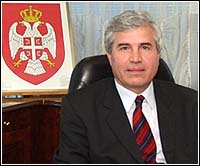
Watch what happens tomorrow when UN High Rep and former MI6 spook Paddy Ashdown (for Bosnia-Herzegovina) holds a press conference about the rejection of a UN-generated police reform proposal by Republika Srpska (pronounced "Sirp-ska") (RS) [RS Prime Minister Pero Bukejlovic shown above].
Critics say the police reform proposal would effectively dissolve boundaries between the two entities that make up B-H, and erode Dayton Accord principles that have been responsible for peace in an area where conflicts previously led analysts to fear sparking of World War III.
While RS supports a central administrative and legislative control over local police, the UN-pushed proposal creates new local police districts which seem intentionally drawn to disregard RS borders. Critics also point out that the situation could result in citizens of Bosnia or RS being policed by hostile figures.
Srpska fears Ashdown will initiate another round of firings of elected officials in SRPSKA, setting in motion a destructive spiral. "We are on the brink of conflagration," says a concerned Srpska official in a letter I obtained. Critics also fear the real goal, and/or ultimate effect will be the dissolution of RS, despite provision made for the entity in the Dayton Accords. [Critics view dissolution possibly being the last felled barrier to Kosovo independence, followed by destabilization across the Balkans as armed paramilitary groups with an eye on "Greater Albania" spark insurrection in Southern Serbia, Montenegro, and Northwest Macedonia.]
Today, Ashdown gave RS Minister of Interior, Darko Matijasevic a 7-day ultimatum to reconsider his decision. I.e. he'll get canned by the UN if he doesn't go along. Accepting the UN-generated police reform proposal has been made mandatory in order for Bosnia-Herzegovina to be accepted into the EU.
Here's what a Congressional staffer told me today:
"Everyone agrees that some police reform is necessary, for example better equipment, education and training, but the real concern is the 'requirement' that the inter-entity borderline change for accession into the EU as part of these police reform talks. It does not appear that the international players are negotiating in good faith by trying to force a decision on the Republic of Srpska to effectively change the BiH Constitution and agreements achieved by the Dayton Peace Accords. The decisions should be made by the consent of all parties, not force, and none of the parties should be targeted for removal or other 'punishment' for not caving into demands that they do not believe are in the best interests of the people of BiH."
We should not forget that BiH was not created as a centralized state, which was Alija Izetbegovic's goal, it was created as a state made up of two entities. So the attempts to create a centralized state are viewed with suspicion. This is because having a centralized state is directly against the Dayton Peace Accords, which is what the people trust for their welfare and right to exist."
See annex 2 - the inter-entity boundary line http://www.usip.org/library/pa/bosnia/dayton_annex4.html
Those in favor of the police reform proposal point to difficulties in pursuing criminals across state lines, which they say emboldens them. They also contend the reforms were carefully crafted according to EU standards. They view RS as instransigent and holding Bosnia back from entry into the EU.
